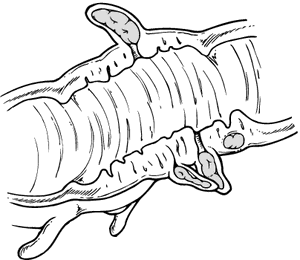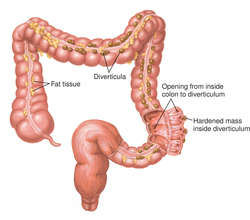Medical term:
diverticulum
diverticulum
[di″ver-tik´u-lum] (pl. diverti´cula) (L.)a circumscribed pouch or sac occurring normally or created by herniation of the lining mucous membrane through a defect in the muscular coat of a tubular organ. See illustration.

Intestinal diverticula. From Dorland's, 2000.
ileal diverticulum Meckel's diverticulum.
intestinal diverticulum a pouch or sac formed by hernial protrusion of the mucous membrane through a defect in the muscular coat of the intestine.
Meckel's diverticulum an occasional sacculation or appendage of the ileum, derived from an unobliterated yolk stalk.
pressure diverticulum (pulsion diverticulum) a sac or pouch formed by hernial protrusion of the mucous membrane through the muscular coat of the esophagus or colon as a result of pressure from within.
traction diverticulum a localized distortion, angulation, or funnel-shaped bulging of the esophageal wall, due to adhesions resulting from an external lesion.
Miller-Keane Encyclopedia and Dictionary of Medicine, Nursing, and Allied Health, Seventh Edition. © 2003 by Saunders, an imprint of Elsevier, Inc. All rights reserved.
di·ver·tic·u·lum
, pl.di·ver·tic·u·la
(dī'vĕr-tik'yū-lŭm, dī'vĕr-tik'yū-lă), [TA] Avoid the incorrect plurals diverticulae and diverticuli.A pouch or sac opening from a tubular or saccular organ, such as the gut or bladder.
[L. deverticulum (or di-), a by-road, fr. de-verto, to turn aside]
Farlex Partner Medical Dictionary © Farlex 2012
diverticulum
(dī′vûr-tĭk′yə-ləm)n. pl. diverticu·la (-lə)
A pouch or sac branching out from a hollow organ or structure, such as the intestine.
di′ver·tic′u·lar adj.
The American Heritage® Medical Dictionary Copyright © 2007, 2004 by Houghton Mifflin Company. Published by Houghton Mifflin Company. All rights reserved.
di·ver·tic·u·lum
, pl. diverticula (dī'vĕr-tik'yū-lŭm, -lă) [TA]A pouch or sac opening from a tubular or saccular organ, such as the gut or bladder.
[L. deverticulum (or di-), a by-road, fr. de-verto, to turn aside]
Medical Dictionary for the Health Professions and Nursing © Farlex 2012
diverticulum
(di?ver-tik'u-lum) plural.diverticula [L. devertere, to turn aside]
DIVERTICULA OF THE COLON
An outpouching of the walls of a canal or organ. See: illustration
diverticulum of the colon
An outpocketing of the colon. These may be asymptomatic until they become inflamed.
diverticulum of the duodenum
A diverticulum commonly located near the entrance of the common bile or pancreatic duct.
false diverticulum
A diverticulum without a muscular coat in the wall or pouch. This type of diverticulum is acquired.
gastric diverticulum
A pulsion-type diverticulum usually on the lesser curvature of the esophagogastric junction.
diverticulum of the jejunum
A diverticulum usually marked by severe pain in the upper abdomen, followed occasionally by a massive hemorrhage from the intestine.
Meckel's diverticulum
See: Meckel's diverticulumdiverticulum of the stomach
A diverticulum of the stomach wall.
true diverticulum
A diverticulum involving all the coats of muscle in the pouch wall. It is usually congenital.
Zenker's diverticulum
See: Zenker's diverticulumMedical Dictionary, © 2009 Farlex and Partners
diverticulum
An out-pouching from, or sac formation on, a hollow organ or structure, such as the bowel. See also DIVERTICULOSIS.Collins Dictionary of Medicine © Robert M. Youngson 2004, 2005
diverticulum
any sac or pouch formed by herniation of the wall of a tubular organ or part, especially the intestines. Inflammation of a diverticulum leads to DIVERTICULITIS.Collins Dictionary of Biology, 3rd ed. © W. G. Hale, V. A. Saunders, J. P. Margham 2005
Diverticulum
Small tubes or pouches that project off the wall of the intestine, visible as opaque on an x ray after the patient has swallowed a contrast (dye) substance.
Mentioned in: Bowel Resection, Colostomy, Congenital Bladder Anomalies, Peritonitis
Gale Encyclopedia of Medicine. Copyright 2008 The Gale Group, Inc. All rights reserved.
Patient discussion about diverticulum
Q. How to prevent diverticulitis? I am a 43 year old man. I just had colonoscopy and my Doctor said I have diverticulosis and am at risk in developing diverticulitis. How can I prevent developing diverticulitis?
A. You have Diverticulosis, which means you have diverticulas (small pouches) on your digestive system. These diverticula are permanent and will not go away. No treatment has been found to prevent complications of diverticular disease. Diet high in fiber increases stool bulk and prevents constipation, and theoretically may help prevent further diverticular formation or worsening of the diverticular condition. Some doctors recommend avoiding nuts, corn, and seeds which can plug diverticular openings and cause diverticulitis. Whether avoidance of such foods is beneficial is unclear. If you develop unexplained fever, chills or abdominal pain, you should notify your doctor immediately since it could be a complication of diverticulitis.
More discussions about diverticulumThis content is provided by iMedix and is subject to iMedix Terms. The Questions and Answers are not endorsed or recommended and are made available by patients, not doctors.
Latest Searches:
Voraxaze - Voranil - Voorhoeve - voodoo - VOO - Vontrol - von - vomitus - vomiturition - vomitory - vomitoria - vomito - vomitive - vomiting - vomit - vomica - vomerovaginalis - vomerovaginal - vomerorostralis - vomerorostral -
- Service manuals - MBI Corp